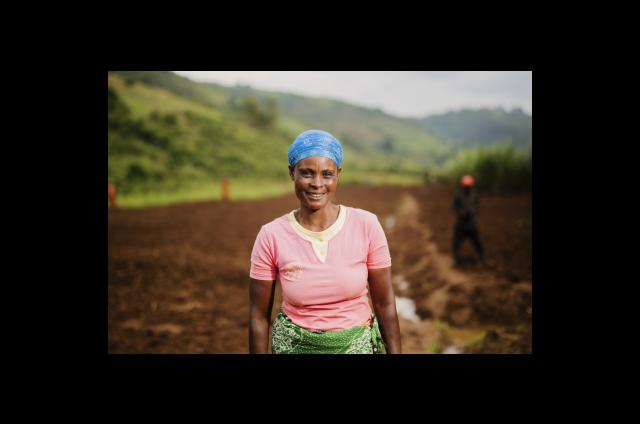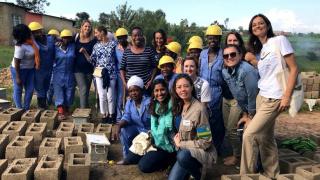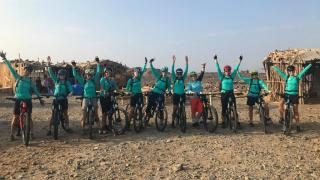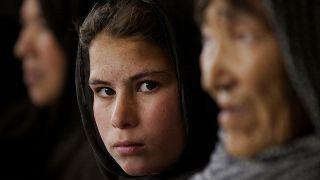Taking on the toughest footrace on earth for women survivors of war
Having been blessed with peace, freedom and opportunity, I feel a sense of duty to help women who have not enjoyed such privileges
The Marathon des Sables (MDS) is a 156 mile race and known as the toughest footrace on earth. Competitors carry everything they need for the week on their back except water (collected at checkpoints) and a shared tent, and survive in temperatures up to 50 degrees Celsius (122 degrees Fahrenheit). It’s a race I’ve been thinking about for more than a decade and preparing for a year.
I’m no extraordinary athlete; never excelled at sport at school, and certainly have never run an ultramarathon before. I only started running marathons when I was 30 (having never competed in anything more than fun runs before) and took a three-year break when we moved to Singapore in 2011. It was too hot to run in 30 degrees!
MDS attracts all sorts. Last year Sir Ranulph Fiennes became the oldest Briton to complete it, aged 71. Double Olympic gold medallist James Cracknell placed 12th in 2010. But there are plenty of less familiar names, from the experienced ultramarathon runners to those who have entered for a dare (and hopefully put a lot of training in between then and getting to the start line)!
On 10th April, I’ll be standing under the blistering heat of the Saharan Desert sun, about to embark upon what will undoubtedly be the biggest physical and mental challenge I’ve ever been through.
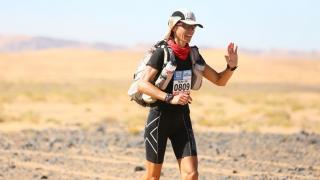
Why I'm running the Marathon des Sables
I can’t imagine enduring what women face in today’s conflicts. It’s unbelievable that it is more dangerous to be a woman in modern war than it is a soldier.
For me, I’ve always been interested in human resilience and what humans can do if they truly put their minds to it. From the athlete who can train body and mind to pull out all the stops on race day, to the victims of violence or war, who somehow find the inner strength to survive and smile another day. I’ve run a number of marathons and done a few treks to date, which could be considered pretty tough; but I’ve never had to endure something really tough.
So MDS is my personal challenge – an ordinary person, taking on an extraordinary race – but I am very aware that it is a first-world luxury. Because the challenges I will face in the desert are nothing by comparison to what women in war-torn countries face.
Hence my desire to raise awareness and funds for Women for Women International. I can’t imagine enduring what women face in today’s conflicts. It’s unbelievable that it is more dangerous to be a woman in modern war than it is a soldier and I can barely finish reading some of the articles describing what these poor women have endured.
I want them to know that there are people who care about them, who want to help them rebuild their lives, and who want to empower them to hope for a better future.
Having been blessed with peace, freedom and opportunity, I feel a sense of duty to help women who have not enjoyed such privileges, and who through no fault of their own have suffered terrible losses and must feel as if the outside world has forgotten about them.
I want them to know that there are people who care about them, who want to help them rebuild their lives, and who want to empower them to hope for a better future. And for those of us who CAN make a difference, but choose not to, I would leave one thought:
The story of the child, who seen frantically throwing starfish back into the sea, was challenged by an old man on why it mattered that he waste his time, when he clearly couldn’t save all the starfish stranded on the beach. As the child picked up another starfish and threw it back into the water, he explained, “It matters to this one”.
Selina McCole is a Women for Women International supporter. She fundraised for our work with women survivors of war in April 2016.
Continue reading
In November 2017, Women on a Mission, a charity that champions women survivors of war around the world, visited our programme in Rwanda. Christine Amour Levar, Co-Founder of Women on a Mission, writes about their experience.
Cycling Through the Gateway to Hell
subtitle:
In November 2017, 12 women embarked on a two-week Mountain Biking Expedition across the Danakil Depression of Ethiopia, to raise funds for our work with women in countries affected by conflict.
Since the Taliban’s return to power in Afghanistan in August 2021, Afghan women have experienced profound changes in their daily lives. The de facto government has reinstated many restrictions, severely limiting the rights and freedoms of women and girls.
Yet, in the face of these challenges, Afghan women have shown extraordinary determination and strength, finding ways to resist and adapt. Here, we explore five significant ways their lives have changed, highlighting both the difficulties they face and their ongoing fight for their rights.

